I was inspired to write this post after reading Brad Friedman’s own post on Agatha Christie’s The Pale Horse (1961) at his wonderful blog: ahsweetmysteryblog. In his post he  comments on the reoccurrence of allusions to Shakespeare’s Macbeth (1611/1623) in Christie’s work, popping up not only in The Pale Horse, but
comments on the reoccurrence of allusions to Shakespeare’s Macbeth (1611/1623) in Christie’s work, popping up not only in The Pale Horse, but 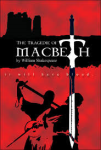 also in By the Pricking of my Thumbs (1968), Hercule Poirot’s Christmas (1938), The Hollow (1946) and A Caribbean Mystery (1964). This reminded me of my own researches I did into Christie a few years ago and came across the idea of Christie being influenced or aligning herself with attitudes voiced in Greek and Jacobean tragedy, Macbeth being an example of such a text. Marty Knepper writes that:
also in By the Pricking of my Thumbs (1968), Hercule Poirot’s Christmas (1938), The Hollow (1946) and A Caribbean Mystery (1964). This reminded me of my own researches I did into Christie a few years ago and came across the idea of Christie being influenced or aligning herself with attitudes voiced in Greek and Jacobean tragedy, Macbeth being an example of such a text. Marty Knepper writes that:
‘In several cases, these literary references connect Christie’s own explorations of the nature of evil and justice in the late novels with two periods in which writers created chilling plays about evil and its consequences: ancient Greece and Jacobean England’ (Knepper, 2005: para 29).
As part of the Tuesday Night Bloggers I have already written a piece on my blog about Miss Marple and classical allusions and therefore Greek Tragedy, so this piece is going to focus purely on the role of Jacobean tragedy in Christie’s novels.
Initially forging a link between esteemed “classic” literature and popular detective fiction may seem a little farfetched but firstly, Lesky Albin (1967) suggests that ‘one of [tragedy’s] components is the “need to explain”’ (Albin, 1967: 10), a component which is crucial to any of the revelation scenes in Christie’s novels. Moreover, Poirot who is rather a rationalist, is always trying to explain or find reasons for certain events or actions. Albin goes onto say that:
‘One working definition of tragedy … could be that it constitutes the dramatic expression of an enquiry into suffering…For tragedy, while representing an instance of suffering in dramatic form, always asks why it has occurred’ (Albin, 1967: 10).
Again the question of ‘why’ is fundamental to the investigations Poirot, Miss Marple and Christie’s other detectives undertake.
Here of course I have been discussing tragedy in more general terms but Jacobean tragedy has certain distinctive features of its own in regards to its’ views on evil, justice and life in general. Overall, Jacobean tragedy presents a cynical and pessimistic view on life and humanity and T. F. Wharton (1988) asserts that ‘the Jacobean enquirer tends to expect to find the worst in human nature’ (Wharton, 1988: 4). Does that remind you of anyone? 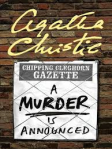 Miss Marple to me seems a perfect embodiment of Wharton’s statement with her mind being likened to ‘a sink’ in A Murder is
Miss Marple to me seems a perfect embodiment of Wharton’s statement with her mind being likened to ‘a sink’ in A Murder is 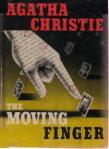 Announced (1950) and described as ‘know[ing] more about… human wickedness than anyone I’ve ever known,’ in The Moving Finger (1942). Additionally in her own words in The Murder at the Vicarage (1930) she says ‘I’m afraid that observing human nature for as long as I have done, one gets not to expect very much from it.’
Announced (1950) and described as ‘know[ing] more about… human wickedness than anyone I’ve ever known,’ in The Moving Finger (1942). Additionally in her own words in The Murder at the Vicarage (1930) she says ‘I’m afraid that observing human nature for as long as I have done, one gets not to expect very much from it.’
Miss Marple also has a definite and uncompromising view on justice and evil. For example, in ‘A Christmas Tragedy’ (1932) she says ‘I have never regretted my part in bringing that man to justice. I’ve no patience with modern humanitarian scruples about capital punishment’ and this is a viewpoint many Jacobean play characters would have agreed with, though they would much prefer executing the justice themselves in as violent a manner as possible. Irving Ribner (1962), whilst discussing the work of Jacobean playwright Thomas Middleton, writes that:
‘There is never any question of the reality of evil or of its absolute distinction from good. Nor is there any doubt of the punishment the sinner must suffer inevitably in a world governed by an inexorable force of divine retribution’ (Ribner, 1962: 9).
Both Miss Marple and Poirot increasingly through the Christie canon hold a similar view  to this, with their notions of good and evil being black and white, which is also evidenced in Christie’s use of biblical references and allusions. This is epitomised in Nemesis (1971) when Amos 5 v4 is included, ‘But let justice roll on like a river, righteousness like a never-failing stream!’ Moreover, the quote from ‘A Christmas Tragedy,’ also parallels the idea in Jacobean
to this, with their notions of good and evil being black and white, which is also evidenced in Christie’s use of biblical references and allusions. This is epitomised in Nemesis (1971) when Amos 5 v4 is included, ‘But let justice roll on like a river, righteousness like a never-failing stream!’ Moreover, the quote from ‘A Christmas Tragedy,’ also parallels the idea in Jacobean tragedy that wrong doers should be punished for their crimes (such as in Middleton’s The Revenger’s Tragedy (1606)) and again in Nemesis there is the strong suggestion that such punishment is inevitable, though the inevitability is coming from the detective, as opposed to ‘divine retribution’.
tragedy that wrong doers should be punished for their crimes (such as in Middleton’s The Revenger’s Tragedy (1606)) and again in Nemesis there is the strong suggestion that such punishment is inevitable, though the inevitability is coming from the detective, as opposed to ‘divine retribution’.
[Spoiler!!! About Curtain] Furthermore, Poirot takes these beliefs to their Jacobean extreme in Curtain (1975) executing his own form of justice on the killer, knowing the law will be unlikely to touch them and like in so many Jacobean revenge tragedies (a subgenre all of their own nearly), he also dies, arguably as a consequence of his actions. Tying in to this, Wharton (1988) says:
‘the boldest of these plays [Jacobean], make their protagonists ask whether, if there is nothing truly stable about their own identity, that means they are capable of committing all evil, at will. They ask whether what is called conscience will be a sufficient deterrent to committing such evils … All these plays ask, how real is the virtue in other people; and, again, experimental proof is directly sought…’ (Wharton, 1988: 3).
I’m not saying Poirot is ‘capable of committing all evil, at will,’ but his actions in Curtain clearly show that he is capable of killing someone and that his conscience is unable to stop him doing so, as it is his conscience which convinced him that if he does not do this, the killer will keep on killing and the fact he goes through with it can be seen as ‘experimental proof’.
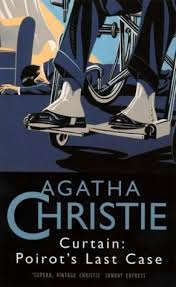
[End of Curtains Spoiler]
[N. B. There are potential minor spoilers below for the following Christie books: Curtain, Towards Zero (1944) and Five Little Pigs (1942). I don’t say who the killer is or how the murder was done but some of my comments touch on motivations and structures of the crimes.]
Specific tragedies from the Jacobean era are also referenced directly in the novels of

Christie. I have already mentioned those which allude to Macbeth, but John Webster’s The Duchess of Malfi (1614) is also included in Sleeping Murder (1976), where the closing lines of this very play sparks off an investigation into a cold case of murder. Othello (1604), another play by Shakespeare is also frequently referred to in Christie’s books directly and indirectly. Directly in Curtain, there is a copy of the play left for Hastings, but indirectly I also think there is a definite Iago
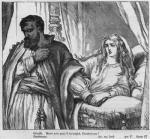
figure, which makes this a more psychologically complex novel. Endless Night (1967) also includes a direct reference to Othello when the narrator says how they played the role of Desdemona’s father as a child. In Five Little Pigs, Othello is also directly referenced when a character says:
“Juliet singles out Romeo. Desdemona claims Othello. They have no doubts, the young, no fear, no pride.”
Thwarted and damage love/romance is central to this mystery and sexual revenge is a key component. This fits in with Jacobean tragedy, especially revenge tragedies, as sexually fuelled revenge features a lot, such as in The Changeling (1622) by Thomas Middleton and John Ford’s Tis Pity She’s a Whore (1629-1633). Furthermore, Towards Zero can be interpreted as a thwarted attempt at a murder motivated by sexual revenge, which in a Jacobean tragedy would no doubt have succeeded (although probably would still involved the death of the revenger).
[Save to resume reading if you were avoiding spoilers]
So that was a brief look at the connections between Christie and Jacobean tragedy. I hope it has been useful and helped you look at the texts in a different light and if nothing else it puts pains to the idea that Christie writes “cozy” mysteries, because as we have seen, quite a number of Christie novels have a much darker side to them. If you know of any other Jacobean plays which are directly or indirectly referenced in Christie’s books do let me know.
Bibliography
Albin, L. (1967). Greek Tragedy. 2nd ed. London: Ernest Benn Limited.
Knepper, Marty S., ‘The Curtain Falls: Agatha Christie’s Last Novels’, Clues, 23 (2005), 69 – 85
Ribner, I. (1962). Jacobean Tragedy. London: Ebenezer Baylis and Son LTD.
Wharton, T. F. (1988). Moral Experiment in Jacobean Drama. London: Macmillan Press.
Good grief, Kate! I inspired that?!? I could never manage such erudition! Brilliant points tying in Miss Marple’s world view with the Jacobeans. I remember reading Sleeping Murder and wondering why Christie would give the game away so early, for after that visit to the theater, I knew who the murderer had to be before I even met him! Do you think Christie assumed her readers were not up on their Webster? I thought the killer was much better hidden in Curtain and the classical allusion even more gripping.
There are three instances in Christie when someone kills for justice – one of them TEN times! – and in each instance, the killer is left in charge of his own punishment. This says a lot about Christie. More problematical to me are those instances where Poirot – never Miss Marple – allows a killer to take his own life rather than face his accusers in court. I suppose this echoes Oedipus’ self-blinding (although that’s a pretty specious comparison), but it seems that, in these cases, Poirot is out of line.
LikeLiked by 2 people
The connections between Marple and Jacobean tragedy were more familiar to me, I imagine there are probably Poirot ones I haven’t thought of. The killer in Sleeping Murder wasn’t that quickly disclosed to me but then again I have never read and at the time was unfamiliar with Webster’s play. Webster’s work isn’t as common as Shakespeare’s, so I suppose Christie maybe wasn’t taking as huge as risk – though of course she hadn’t reckoned on you of course! But you are right, the killer is much more hidden in Curtains and the Othello link is much interwoven into the narrative. Also again you are right about Poirot being less conventional in his execution of justice (Murder on the Orient Express is a good example of that), but I think he is a much more maverick detective than Miss Marple and this element of him does lend a bit of predictability to an otherwise very ordered character.I did wonder whether there was any Jacobean parallels for Christie novels where the killer couples, are murdering a spouse in order to get the money. Felt kind of Jacobean but no specific play came to mind.
LikeLike
Play it down all you like, Kate, this is still an awesome piece of blogging – it would take me months to draw these sorts of connections, and you’ve just happily sat down at tied it all together with fabulous erudition and clarity. Superb work.
On another note, is Brad Friedman the new muse of crime bloggers? He’s inspired this, he’s taken over four weeks of my life by inspiring my Kings of Crime…who else out there is labouring away because of some stray comment Brad made? Do YOU have a story about the impact Brad has had on your blogging life? Contact us now…
LikeLiked by 1 person
haha I think you might be right about Brad, being a crime blogger’s muse and glad you liked the post.
LikeLike
Outstanding post, Kate, and utterly fascinating. Congrats.
But… (and feel free to edit this out) it’s Curtain not Curtains.
LikeLiked by 1 person
whoops… all changed now though… no one will ever know… unless they read this of course! Since you’ve read way more Carr than me, do you think any of his novels connect with Jacobean tragedy at all?
LikeLike
Whoops. Forgot to reply. And to be honest, my knowledge of Jacobean tragedy is minimal so I can’t really answer the question anyway…
LikeLiked by 1 person
Fair enough. My own knowledge of Jacobean tragedy is not as extensive as I’d like either. Though it may be the case that Carr prefers to draw more on gothic literature than 17th century tragedy. I have a few more Carr novels in my TBR pile so I’ll have to keep my eyes peeled for signs of Jacobean tragedy in them.
LikeLike
Great blog post. I think Christie was very influenced by the theatre generally, and (quite agree with you) Jacobean theatre in particular. There are lots of instances of a murder being “staged” or of the murderer having to act a role – Sparkling Cyanide, Dead Man’s Folly etc. Webster, in particular, does seem to have been a huge influence on contemporary crime writers from Christie to P.D. James (Cover her face, The skull beneath the skin) and Robert Galbraith’s The silkworm.
I have an especial fondness for the Christie novels influenced by Jacobean theatre – By the pricking of my thumbs and Sleeping Murder are so gloriously dark.
LikeLiked by 1 person
Yes Sleeping Murder is also one of my favourites. I hadn’t realised Webster’s influence stretched to writers such as James and Galbraith – but good to know and you are definitely right about murders being staged in certain ways by the killers (They Did It With Mirrors is a good example of that). Other writers like Marsh also did this but with Christie it is that much darker.
LikeLike
I’ve mentioned several times that The Duchess of Malfi is perhaps the most frequently alluded to Jacobean drama in all of crime fiction. I know of at least ten books that use some quote or image or refer to Bosola over the course of the novel. Why? It may be the cruelest, darkest and most ruthless plays to deal with murder and unbridled sexuality in all of English language literature. A crime writer would find much to draw from in its amoral plot. Why was it so well known throughout the 1930s and 1940s? It was constantly being produced in professional companies during that era. A reaction to wartime? A commentary on inescapable violence? Too many reasons to choose from. I find it fascinating that the line “Cover her face; mine eyes dazzle. She died young” from …Malfi is one of the most frequently quoted lines of Webster’s in crime fiction. The line turns up at least twice in Christie’s work, pops up all the time in detective novels both old and new in both the US and the UK, and serves as the title for a handful of mystery novels, the most well known being by P. D. James. A knowledge of Jacobean drama will come in very handy for any reader of both contemporary and Golden Age crime fiction. There is an excellent late 20th century detective novel in particular in which the solution can be arrived at by knowing the final twist in a play by John Ford.
LikeLiked by 1 person
Yes having done this post I have come to same conclusion that prior knowledge of Jacobean plays would come in useful when reading crime fiction. I think for me I know a number of the titles of such plays but don’t know sufficient about the plots, though I am more informed on Shakespeare, Marlowe and one play of Ford’s: Tis Pity She’s a Whore. Is this the play you were thinking of in your final comment?
LikeLike
[…] of the allusions detective fiction writers make to Shakespeare and other Jacobean playwrights (click here for my own brief musings on the topic), but I have yet to read a book which looks at such allusions […]
LikeLike
[…] equally give this piece an emotional resonance that you would expect to see in a Shakespearean tragedy and more than once Ty’s behaviour put me in mind of the avenging Furies. Furthermore, one […]
LikeLike
[…] Miss Marple and Jacobean tragedy […]
LikeLike
[…] and Jacobean, (and I have written a post about connections to the latter in a separate post), I think my brain leapt to the Greek brand as when Jacqueline builds up her performance as the […]
LikeLike